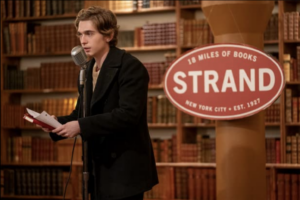“It is the type of town where you get asked out on LinkedIn.”
As 31-year-old Perry Slomnicki summed up in one simple sentence, dating in the District is nothing short of a mess.
For its seventh season, Netflix’s Love is Blind is back for another round in the “pods,” this time in the nation’s capital. Designed to make people fall in love with each other without ever seeing what the other looks like, the show strives to create relationships rooted in emotional understanding rather than just physical attraction. D.C. has long been known as one of the worst dating scenes in the country, but the reality show is hoping to bring some happy endings to the city. On Oct. 2, Netflix released the first six episodes on streaming, introducing audiences to the 30 singles seeking love this season. The season sets itself up to somehow both encapsulate the District’s dating pitfalls yet be unrepresentative of real life in D.C.
Intense professional culture makes itself a clear culprit of the city’s unsuccessful dating scene from the get-go. The cast comprises clearly hardworking, job-oriented, professionally successful individuals. Garrett Josemans, a quantum physicist, explains that he is so into his work that it has prevented him from looking for a life partner. Hannah Jiles, the youngest of this season’s women, is an even clearer example of D.C.’s workaholism: formerly in medical device sales, she quit her job to come on the show, signaling that leaving work is the only way she can envision finding her perfect match.
The show also captures many of the personalities commonly found in the local dating scene. Nick Dorka, a 29-year-old real estate agent, comes off as the typical D.C. single man: a sarcastic flirt. A former all-American college football player, he is quick to talk about his previous successes and accomplishments while layering on the charm. Early on, the women describe him as a smooth talker, nicknaming him Mr. Suave. After first impressions, Hannah jokingly says that while he is sultry, he will probably ruin her life. She thinks Nick D. objectifies her, is wary of his numerous experiences with women, suspects his smooth talk could be manipulating her, and worries she will always feel the need to be perfect around him. Despite the other women calling him a “walking red flag” and promising her he is not the love of her life, Hannah has a difficult time letting Nick D. go.
Another typical D.C. boy, 31-year-old Leo Braudy is an example of the impressively young and successful people populating the District’s most elite circles. Having inherited his family’s art dealing business, he has no problems with money; the other men frequently laugh at the Rolex on his wrist. While he recognizes his fortune, money remains an insecurity for Leo, fearing that women only want him for his wealth. Though he acknowledges his privilege, he also can’t stop reminding everyone about it. Leo represents the manufactured humility underscored by an ample amount of self-admiration that runs rampant among many D.C. singles.
In a respite from the traditional dating pitfalls, two cast members tease a potential D.C. dating success. Garrett and 30-year-old Taylor Krause quickly become a promising couple. Escaping the obligatory D.C. career small talk, they connect intellectually, bonding over shared experiences in the sciences and nerdy tattoos. They discuss how their intense professional ambitions have inhibited their ability to focus on dating and agree that a successful love story requires constant and mutual effort. The pair demonstrates a rare synthesis of the insatiable ambition and refined intelligence many D.C. professionals embody in their hopeful dating prospects.
While the show captures some of the key components of the District’s dating scene, it falls short in accurately representing its residents.
Notably, the cast’s experiences do not properly embody the core of D.C.’s professional world. Many of the singles work in business, marketing, or sales. There are a surprising number of real estate agents and estheticians, yet shockingly, only two consultants. There are no cast members explicitly involved in politics or government, the closest being Ramses Prashad, a “program associate at justice reform nonprofit,” and Taylor, a “clean energy policy consultant.” To disregard a quintessential aspect of D.C.’s professional life causes the show to fall short of capturing the unique culture and social dynamics of the city.
More importantly, this season’s participants are unrepresentative of D.C.’s true population. As the nation’s first majority Black city, the “Chocolate City” has been a hub of Black culture and political power. And while the city’s demographics have changed and its former nickname’s accuracy is fading, D.C. continues to have one of the largest shares of Black residents, at 41%. Yet, like most things in the media, the show remains predominantly white. The problem of representation is most acute among the male cast, and as a result, the show’s participants do not reflect the true heart of the District.
The cast’s experiences and demographic makeup highlight another problem often omitted from the District’s media representation. Although a sizable portion of the city is Black, D.C. remains highly segregated. Black residents are concentrated east of the Anacostia River in Wards 7 and 8 and the city’s geographic division of races has barely changed since 1970. The show’s choice of participants, from their limited ethnic composition to professional experiences, portrays a certain image of the District—one sanitized of its racial history and only indicative of the highest socioeconomic classes. Rather than coming across as “Love is Blind: DC,” the season feels more as if it was meant to be “Love is Blind: Georgetown” or “Love is Blind: Northern Virginia.”
The first 72 minutes of the season showcased the factors making D.C.’s dating scene notoriously terrible, while at the same time overlooking the culture and people that give the city its unique charm. Nine more episodes remain, and the love stories are just beginning to take shape. As the season progresses, it remains to be seen whether the city will redeem its dating reputation, or prove love in the District is truly hopeless after all.







